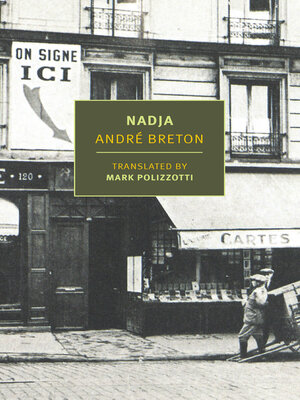
Sign up to save your library
With an OverDrive account, you can save your favorite libraries for at-a-glance information about availability. Find out more about OverDrive accounts.
Find this title in Libby, the library reading app by OverDrive.



Search for a digital library with this title
Title found at these libraries:
| Library Name | Distance |
|---|---|
| Loading... |
A new translation of one of the defining works of the French surrealist movement, an energetic autobiographical novel that is at once both a tumultuous romance story and an initiation into the surrealism of everyday life.
In Paris, during the fall of 1926, André Breton met a young woman from the provinces who called herself Nadja because, she said, "in Russian it's the beginning of the word for hope, and because it's only the beginning." Their love affair was brief, intense, and intensely self-conscious. They both talked exuberantly of the book that Breton would make out of their days and nights. And indeed a year later (after Nadja was institutionalized and Breton had moved on to other love affairs) he began to write Nadja—a book of memory and analysis taking its cue in part from Freud's case studies, but also a book of ingeniously intercut images, drawing on Surrealist ideas to portray a soul whose very way of being approaches, in Breton's words, "the extreme limit of the Surrealist aspiration."
In this, the first new translation of Nadja in more than sixty years, Mark Polizzotti captures the youthful excitement, the abiding strangeness, and above all the freshness of Breton's prose. He also provides an illuminating introduction about the fate of the real Nadja, whose identity remained jealously guarded until the twenty-first century.
A gripping tale of infatuation and a meditation on the surrealism of everyday life, Nadja is still a thing of convulsive beauty, impossible to pin or put down, a precursor to works of Julien Gracq, Julio Cortázar, and W.G. Sebald.
This edition of Nadja contains 44 images, which Breton “conceived from the outset as an integral element of the narrative," as Mark Polizzotti writes in his introduction.
In Paris, during the fall of 1926, André Breton met a young woman from the provinces who called herself Nadja because, she said, "in Russian it's the beginning of the word for hope, and because it's only the beginning." Their love affair was brief, intense, and intensely self-conscious. They both talked exuberantly of the book that Breton would make out of their days and nights. And indeed a year later (after Nadja was institutionalized and Breton had moved on to other love affairs) he began to write Nadja—a book of memory and analysis taking its cue in part from Freud's case studies, but also a book of ingeniously intercut images, drawing on Surrealist ideas to portray a soul whose very way of being approaches, in Breton's words, "the extreme limit of the Surrealist aspiration."
In this, the first new translation of Nadja in more than sixty years, Mark Polizzotti captures the youthful excitement, the abiding strangeness, and above all the freshness of Breton's prose. He also provides an illuminating introduction about the fate of the real Nadja, whose identity remained jealously guarded until the twenty-first century.
A gripping tale of infatuation and a meditation on the surrealism of everyday life, Nadja is still a thing of convulsive beauty, impossible to pin or put down, a precursor to works of Julien Gracq, Julio Cortázar, and W.G. Sebald.
This edition of Nadja contains 44 images, which Breton “conceived from the outset as an integral element of the narrative," as Mark Polizzotti writes in his introduction.







